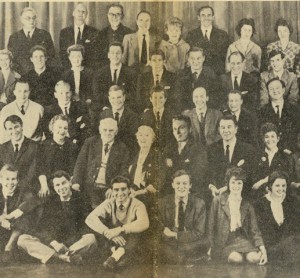
The past is ‘This happened’ and then ‘This happened’ and then ‘This happened’, isn’t it? The past: a series of events, a series of dates even. If we want to make sense of the past we can choose moments from it, try to sort out which moments are important, and link them – this led to this, this led to this, and this led absolutely nowhere (history as a basic theatre plot, if you like).
If we’re ambitious, we might even try to give past events some sort of meaning. Perhaps this event displayed a spirit of innovation; this showed a certain courage and this then revealed a sad timidity.
Much of the data we can gain is from written records. In the case of Chichester Festival Theatre, the records are extensive. There are all the contracts with directors, writers, actors, musicians, designers and the rest – including, of course, architects. And then there are all the theatre programmes and reviews. So there is a lot on the page already.
But what about the feelings of those involved? How did it feel to be parading through the streets of the city as part of theatrical celebration? How did it feel to be part of an enormous production of Nicholas Nickleby? How did it feel to be taking the Theatre in a radical new direction, as in 2003 when new leadership put reaching out to the community centre stage ? Very little of this emerges from the documents.
And what did the day-to-day fabric of working in the theatre consist of? What were the routines, the daily necessities? And, along the way, what were the personal idiosyncrasies, the little disasters, the anecdotes? Here too, the documents tell us little.
For this, we need to talk to people. We need to access that vast reservoir of experience held in people’s memories. There is this a huge, rich store of experience which we will only access by talking to people, helping them to explore their memories, helping them to re-live the memorable and, frankly, not-so memorable moments from their lives entwined with Chichester Festival Theatre (and what we capture will not be in the polished finery of written language but in the spontaneous outpouring of the spoken word).
Meanwhile, none of us live for ever, so we had better hurry up, if we are to pass on these wonderful, personal lived experiences of a remarkable theatrical venture to future generations. Otherwise, they will be gone forever.
Rib Davis has been brought in to help Pass It On as our Oral History expert. He’ll be training volunteers and Youth Theatre members in oral history collection techniques and helping in the running of this part of the project. Find out more about Rib, his work and Oral History on his website.


